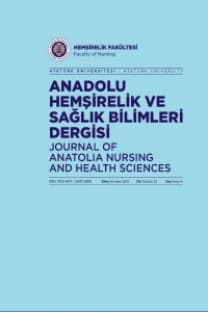OPINIONS OF HEALTH CARE PROFESSIONALS REGARDING NURSING PROFESSION
Öz
ABSTRACTObjective: This study was conducted to determine the opinions of health care professionals about the nursing profession. Methods: Descriptive design was used. The sample consisted of 370 health care professionals. Of the health care professionals that participated in the study, 38.2% were nurses (n=141), 24.6% physicians (n=91), 28.6% pharmacists (n=53), 28.6% dentists (n=53), 5.1% dietitians (n=19), and 3.5% physiotherapists (n=13). Data was collected by a questionnaire. Results: Some of nurses (21.7%), 60% of physicians, 68.6% of pharmacists, 94.3% of dentists, 73.7% of dieticians and 76.9% of physical therapists agreed with the statement "Nurses are the physician's assistant". Most of the health care professionals (77% to 95%) except nurses said they disagreed with the statement "I would like to be a nurse". Conclusions:This study found that most of the health care professionals evaluate the status of nursing profession as low, approximately half of them evaluate nursing as an independent profession and more than half of them evaluate nursing as physician's assistant.Keywords: Nursing profession, health professionals, dentists, pharmacists, dietitians, physiotherapists, opinionÖZETSağlık Profesyonellerinin Hemşirelik Mesleğine İlişkin GörüşleriAmaç: Araştırma sağlık profesyonellerinin hemşirelik mesleğine ilişkin görüşleri belirlemek amacıyla yapılmıştır. Yöntem: Tanımlayıcı tipte yapılan araştırmanın örneklemi 370 sağlık profesyonelinden oluşmuştur. Araştırmaya katılan sağlık profesyonellerinin % 38.2’si hemşire (n=141), % 24.6’sı hekim (n=91), % 28.6’sı eczacı (n=53) ve diş hekimi (n=53), % 5.1’i, diyetisyen (n=19) ve % 3.5’i fizyoterapisttir (n=13). Araştırmanın verileri anket formu ile toplanmıştır. Bulgular: Hemşirelerin % 21.7’si, hekimlerin % 60’ı, eczacıların % 68.6’sı, diş hekimlerinin % 94.3’ü, diyetisyenlerin % 73.7’si, fizyoterapistlerin % 76.9’u “Hemşireler doktorun yardımcısıdır” ifadesine katıldıklarını belirtmişlerdir. Hemşireler hariç sağlık profesyonellerinin çoğu (% 77- %95) “Hemşire olmak isterdim” ifadesine katılmadıklarını ifade etmişlerdir. Sonuç: Bu çalışmada sağlık profesyonellerinin çoğunluğunun hemşirelik mesleğinin statüsünü düşük olarak, yaklaşık yarısının hemşireliği bağımsız bir meslek olarak ve yarıdan fazlasının hemşireleri hekimin yardımcısı olarak değerlendirdikleri bulunmuştur. Anahtar kelimeler: Hemşirelik mesleği, sağlık profesyonelleri, diş hekimi, eczacı, diyetisyen, fizyoterapist, görüş
___
- Akeroyd J, Oandasan I, Alsaafar A, Whitehead C, Lingard L. Perception of the role of the registered nurses in an urban interprofessional academic family practice setting. Nursing Leadership 2009; 22 (2): 73- 84.
- Birol L. Hemşirelik Süreci. 1. Baskı. Istanbul: Etki Publications; 2010. p.20-28
- Emiroğlu ON. Sağlık Personelinin ve Toplumun Hemşirelik İmajı (Image of Nursing Among the doctors, nurses and general public). Hemşirelikte Araştırma ve Geliştirme Dergisi 2000; 2(1): 9-18.
- International Council of Nurses. Safe Staffing Saves Lives. Information and Action Tool Kit. Genava; Jean-Marteau, CH-1201, 2006. p. 1-16. Korkmaz F. Meslekleşme ve Ülkemizde Hemşirelik (Profesionalizm and Nursing in Turkey) Sağlık Bilimleri Fakültesi Hemşirelik Dergisi 2011; 18(2): 59-67.
- Korkmaz F, Görgülü S. Hemşirelerin, Meslek Ölçütleri Bağlamında Hemşireliğe İlişkin Görüşleri (Viewpoint of Nurses on Nursing in Respect to Professionalism Criteria). Sağlık Bilimleri Fakültesi Hemşirelik Dergisi 2010; 17(1): 1-17.
- Nahcivan N. Sağlık Bakım Sistemi (Health care system). Atabek Aştı T, Karadağ A, editörler. Hemşirelik Esasları Hemşirelik Bilimi ve Sanatı. 1. Baskı. Istanbul: Academi Basın ve Yayıncılık; 2012. p.47-53
- Özpancar N, Aydın N, Akansel N. Determination of Begining Nursing Students' Perceptions About Nursing Profession. Cumhuriyet Üniversitesi Hemşirelik Yüksek-okulu Dergisi 2008; 12(3): 9-17.
- Takaze M, Maude P, Manias E. Impact of the perceived public image of nursing on nurses' work behaviour. Journal of Advanced Nursing 2006; 53(3): 333-43.
- ten Hoeve Y, Jansen G, Roodbol P. The nursing profession: public image, self-concept and professional identity. A discussion paper. Journal of Advanced Nursing 2014; 70(2): 295-309.
- United States Department of Health and Human Services. The Registered Nurse Population: Findings from the 2004 National Sample Survey of Registered Nurses. Washington: Health Resources and Services Administration; 2004. p.3-43
- Vicdan AK. Hemşirelikte Profesyonellik (Professionalism in Nursing). Maltepe Üniversitesi Hemşirelik Bilim ve Sanatı Dergisi 2010; 3(Özel Sayı): 262-63.
- Yıldırım D. Hemşirelerin Servislerde Hastalarla İlgili ve Diğer İşlere Ayırdıkları Sürenin Belirlenmesi (Nurses Staff Allocation Related to Patient and Other Interventions in the Wards). Istanbul Universitesi Hemşirelik Yüksekokulu Dergisi 2006; 14(56), 177- 92.
- White J. The Image of Nursing: What It Is and How It Needs to Change. In A. Finkelman, C. Kenner (Eds), Professional Nursing Concepts. Burlington; Jones & Bartlett Learning, 2013.p.85-91.
- Wlodarczyk D, Tobolska B. Professional image of nurses as perceived by doctors, patients and nurses themselves. Medcycna Pracy 2011; 62(3): 269-79
- ISSN: 1309-5471
- Yayın Aralığı: Yılda 4 Sayı
- Yayıncı: Atatürk Üniversitesi Hemşirelik Fakültesi
Sayıdaki Diğer Makaleler
YENİDOĞAN GÖBEK BAKIMINDA KLORHEKSİDİN, İYOT VE ALKOLÜN KARŞILAŞTIRILMASI
Refika GENÇ KOYUCU, Yıldız TOSUN, Fadime ÇINAR
Hatice ÖNER ALTIOK, Mehtap KIZILKAYA
NÖROŞİRÜRJİ HASTALARININ AMELİYAT ÖNCESİ ANKSİYETE DÜZEYLERİ
Sevban ARSLAN, Seçil TAYLAN, Sevgi DENİZ
KAHKAHA TERAPİSİ VE SAĞLIK ALANINDA KULLANIM ÖRNEKLERİ
Özlem KARDAŞ KİN, Yasemin YILDIRIM
OPINIONS OF HEALTH CARE PROFESSIONALS REGARDING NURSING PROFESSION
Sultan AYAZ ALKAYA, Şengül YAMAN
ÇOCUK KLİNİKLERİNDE ÇALIŞAN HEMŞİRELERİN TIBBİ HATA YAPMA EĞİLİMLERİNİN İNCELENMESİ
Emine Şireci, Elanur Yılmaz Karabulutlu
PSYCHOSOCIAL ADJUSTMENT IN HEART FAILURE PATIENTS WITH CARDIOVERTER DEFIBRILLATOR IMPLANTATION
Arnel BÖKE KILIÇLI, Leyla ÖZDEMİR
